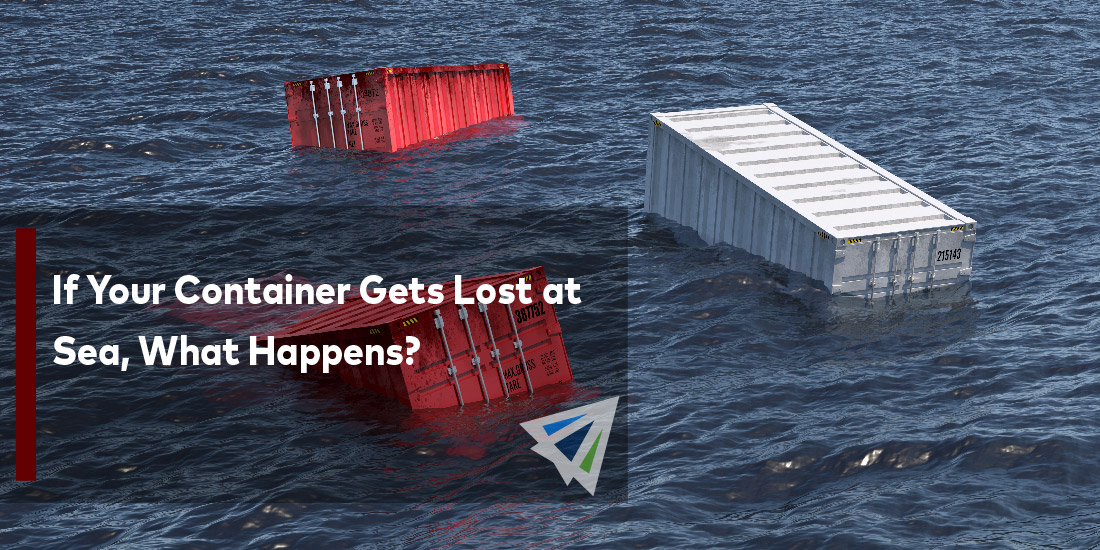If Your Container Gets Lost at Sea, What Happens?
Let’s talk about a scenario nobody thinks will ever happen to them. The infamous transfer of your cargo from the ship to Davy Jones Locker. But it happens. We like to think container ships are invincible enough to withstand any natural disasters, but that’s not always the case.
The World Shipping Council estimates that an average of nearly 800 containers are lost at sea each year. Sure, that number is low in comparison to the number of shipments happening. However, the fact remains: disasters happen, containers go missing, and shippers may not be prepared to deal with the ramifications of these instances. This leaves many shippers asking: “What happens if my container gets lost at sea?”
Containers Lost at Sea: What to Expect
Shippers are puzzled at the fact that containers sometimes just topple over into the ocean. Before we dive into exactly what happens after your container is lost at sea, let’s examine a few causes as to why it happens in the first place. Here are a few common reasons that shipments get lost at sea.
Weather
Weather is usually predictable, but sometimes, Mother Nature has her own plans. Certain world oceans are at higher risk for unforeseen weather conditions than others. In particular, the Pacific Ocean has been known for its high winds, rough seas, and powerful storms.
That said, it is important to be aware of the specific routes your cargo usually takes so you understand the risks associated with potential weather issues along the way. Once again, the risks are low, but it does happen from time to time.
Incorrect Loading
In many cases, the reason for cargo loss is that containers were not correctly loaded onto the vessel or were incorrectly secured (or not secured at all) for rough weather. In addition, container ships are getting bigger and have been stacking containers higher to accommodate for the increase in demand. While most decisions being made are done within the margins of safety, container stacks are getting as tall as a medium sized building in some instances.
The higher containers are stacked, the more forces they are subject to when the vessel moves in waves. You’re essentially multiplying the forces experienced on the deck several times for the containers at the top. Although they stack containers within reason, minor changes in movement due to increased waves on the ground are multiplied tenfold for the containers at the top.
What Happens When Containers are Lost at Sea
Believe it or not, there are no international conventions specifically covering the loss of shipping containers. In fact, steamship lines are not even required to report lost containers unless the cargo contained hazardous materials. But if nothing dangerous was in the container, there is absolutely no obligation for the steamship line to report the loss.
What’s unfortunate about this is that lost containers can spread pollution and trash across coastal reefs and ocean waters thousands of miles over the course of just a couple of months.
Some container ships only realize that containers were lost at sea by the time they are unloading and taking inventory, at which point, it’s a lost cause to identify the point at which the cargo was lost.
While specific countries may have some provisions and laws surrounding cargo loss and who is responsible for the retrieval of the goods, there is an overall lack of regulations on cargo loss at sea. It usually becomes the responsibility of volunteers or non-governmental organizations in coastal and First Nations communities to do most of the cleanup work for lost containers.
How Much Will You Be Paid for Lost Cargo?
Here’s the section you’re most likely here for.
“If my cargo gets thrown overboard, I’m going to get my money back since it’s the carrier’s fault, right?”
Oh, how we wish that was the case. Unfortunately, due to Carrier Legal Liability, you’re going to be walking away with $500 at max. Why?
Carrier Legal Liability refers to the amount of money that your carrier may potentially be responsible for paying. However, this number is usually extremely low, and in the case of international ocean shipments, it’s incredibly low.
The liability an ocean carrier is responsible for is defined as “$500 per shipping unit.” While many shippers think this refers to “$500 per item,” ocean carriers actually define this as “$500 per shipping container.” Essentially, if your cargo goes overboard, you’re going to get a paycheck for a maximum of $500 total (but if we’re honest, you probably aren’t going to get anything.)
What does this all mean?
Insure Your Cargo
Despite what most people think, cargo insurance is not expensive, and it is a safeguard against any potential disasters, including the loss of your entire container in the ocean. What most shippers don’t think about is that a lost container isn’t just a loss. Rather, it’s a requirement for you to repurchase your cargo twice.
Most shippers don’t begin insuring their cargo until after a major disaster. Starting now is the best move.
If you’re interested in cargo insurance, don’t hesitate to reach out and get ahold of one our team members! We would love to talk to you about how much it would cost and how it can secure your business from major financial loss with unforeseen shipment disasters.
